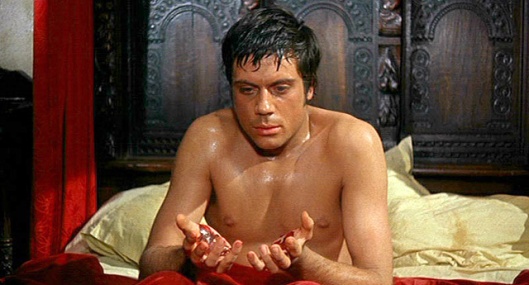Tags
 Sometimes the most interesting films are the ones that don’t quite work. The talent, ambition and imagination responsible for that added interest often are responsible for the failure. Conventional success results from people delivering what is expected without trying anything different. Such hack work describes 90 percent of the output in any art form. Imagination, on the other hand, can lay bare the contrivances that the hack exploits.
Sometimes the most interesting films are the ones that don’t quite work. The talent, ambition and imagination responsible for that added interest often are responsible for the failure. Conventional success results from people delivering what is expected without trying anything different. Such hack work describes 90 percent of the output in any art form. Imagination, on the other hand, can lay bare the contrivances that the hack exploits.
The Curse of the Werewolf, an early sixties offering from Hammer Films, is a good example, for it is both more and less than a standard exploitation horror film. Set in 19th century Spain, the Hammer crew start with a tangible effort to make us understand we should leave behind our expectations of Transylvania. The characters, extras, architectural details and costuming self-consciously declaim that “We are in Spain!” Still, one of the most entertaining aspects of Hammer Films is to see how they pull yet another rabbit out of their hat of limited resources, so if the results this time are not quite convincing, they remain vastly entertaining.
More uncharacteristic is the treatment of the central character, Leon (Oliver Reed). Even allowing for the fact that the werewolf legend usually depicts the monster as a victim rather than an agent of evil, Leon is especially tortured and pathetic. There also is a surprisingly complex explanation for his condition. Conceived in a rape, itself resulting from the despicable behavior of a domineering hidalgo, Leon is further cursed by being born on Christmas—a portent of disaster because he was unwanted.
In short, Leon’s condition is steeped in a guilt resulting from events outside his control. So when a combination of lust and inebriation finally releases the animal within, seeing him brought low by something he is powerless to overcome cannot fail to make him at least a little sympathetic. For it takes only a little imagination to recognize his condition as a simple exaggeration of the difficulties caused by our own animal nature.
Unfortunately, such an ambitious theme raises huge questions. One obvious example: if lust arouses Leon’s animal nature, how is he able to reach young manhood without indulging in carnage? It strains credibility to believe he’s had a spotless record between his one childhood bout of bloodlust and the film’s climactic episodes. Almost in distraction from such questions, once Leon goes on a rampage, the results are among the most vicious sequences in Hammer’s history, as if Leon is making up for lost time.
In short, when tackling an emotionally complex subject, the makers of The Curse of the Werewolf set themselves up for failure. The generic situation and limited resources cannot match the thematic complexities hinted at in the material. For all their flair, the filmmakers cannot quite make a vivid, bloody exploitation vehicle into a perceptive examination of the Id. It is nonetheless to their credit that their results at least suggest that possibility.

As much as I love Oliie Reed and Hammer Films, this was always somewhat of a disappointment to me aside from the fantastic make up design by Roy Ashton.
Yes, it never does come together as well as it should or you might hope. Still, it has lots of good in it.